EDITOR’S NOTE: Please be sure to read Lynn Jackson’s “Wilderness Quandary: Does ‘Pretty’ Make Wilderness?” elsewhere in this issue. The retired Utah BLM staffer offers his views on another aspect of the wilderness debate–the nuts and bolts of the law and the process and its various interpretations…JS
UTAH WILDERNESS. DEBATE…part 1
Does Anybody Still Care?
“We must not be afraid to follow the truth, no matter where it may lead.”
—Thomas Jefferson
Meanwhile proponents of Utah wilderness have spent the last 20 years urging the passage of a massive “Redrock Wilderness Bill” promising first and foremost that its commercial development and exploitation via a “tourist/amenities” economy will generate untold revenues for the rural West. They say very little these days about solitude, remoteness and the need of a base camp for revolutionary warfare.
From these two ignominious positions comes Utah’s decades old battle for wilderness, a fight that for one reason or another, has been waged continuously for almost a quarter century. In 2011, I’m not sure anybody even gives a damn.The Utah Wilderness Debate reminds me of the Vietnam War. For those of us who lived through that strange time, it was one of those stories that was always there. Every day for 20 years. We grew up with Vietnam, it was always in the headlines, we participated in it on one level or another—either for or against—and for many of us, it seemed as if the story and the war would go on forever. When it finally sputtered to an end, we hardly knew what to do with ourselves or what to make of the outcome. A generation later, Vietnam’s “threat” to the United States manifests itself mainly in the manufacturing base it has established for itself. Like its Chinese neighbors, Vietnam’s cheap labor force has grabbed many of America’s industries, including Osprey outdoor gear, once manufactured exclusively by Native American craftspersons in Cortez, Colorado. Now much of the work is done in Ho Chi Minh City.
Last year Osprey partnered with the Southern Utah Wilderness Alliance at the Outdoor Recreation Show in Salt Lake City, distributing pro-wilderness post cards and donating a few “made in Vietnam” packs. Welcome to the new Global Wilderness Economy, 2011-style.
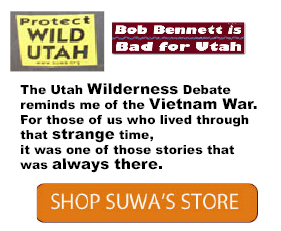
This is what the “fight for wilderness” has become. How did it get like this? Consider this brief history…
The Wilderness Act was passed by Congress in 1964 but it wasn’t until 1976 that the BLM, mandated by the Federal Land Policy and Management Act (FLPMA), initiated an inventory of road-less areas across the country.
In 1980, Utah BLM came up with about 2.5 million acres of “wilderness study areas (WSAs) that it deemed wilderness-worthy. Later that number climbed to 3.2 million. These acres would be henceforth managed as wilderness, though to this day, Congress has not passed a comprehensive wilderness bill.
Environmentalists at the time were outraged and thought the inventory failed to include all BLM lands with wilderness potential. One group, the Utah Wilderness Association, was agreeable to a compromise to get some kind of bill passed, but otherwise, opposition to the BLM inventory was adamant.
The Utah Wilderness Coalition (UWC), a collection of 40 state and national groups supported a larger wilderness proposal of 5.1 million acres. The most visible and vocal of these groups would be the Southern Utah Wilderness Alliance ( SUWA), originally a grassroots organization based out of Boulder, Utah. SUWA was not well-received by a mostly rural Southern Utah population and its founding members were even burned in effigy in 1982.
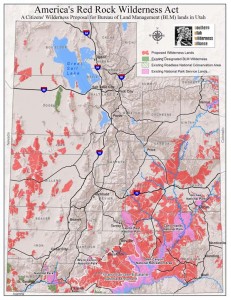 The UWC proposal grew to 5.4 and then to 5.7, when the first “Redrock Wilderness “ bill was introduced in Congress by then Rep. Wayne Owens in 1989. The late-Congressman Owens is the only Utah congressional representative of either party to ever support the bill. Since 1993, Rep. Maurice Hinchey of New York and Sen. Dick Durbin of Illinois have introduced the legislation in Congress.
The UWC proposal grew to 5.4 and then to 5.7, when the first “Redrock Wilderness “ bill was introduced in Congress by then Rep. Wayne Owens in 1989. The late-Congressman Owens is the only Utah congressional representative of either party to ever support the bill. Since 1993, Rep. Maurice Hinchey of New York and Sen. Dick Durbin of Illinois have introduced the legislation in Congress.In 1996, under the direction of Secretary of the Interior Bruce Babbitt, the BLM re-inventoried its Utah lands and concluded that environmentalists were right. The BLM now determined that 5.8 million acres possessed wilderness values, more than matching the acreage in the UWC proposal.
Maybe an agreement was at hand.
Instead the UWC undertook another “citizens’ inventory” of potential wilderness lands in Utah. When the process was complete, environmentalists announced that they had, in fact, found another three to four million acres of wilderness-quality “road-less” areas.
But what does “road-less” mean?. In the late 1970s, the BLM decided that a “road” had to be constructed and maintained and that usage, no matter how frequent or heavy, was irrelevant. Rural Westerners objected and even today, many pro-wilderness environmentalists fail to understand this important fact. A Moab businessman and “proud business supporter of SUWA” recently complained to me, “What more do all these jeepers want? There are hundreds of jeep roads left over from the uranium days.” When I explained that hardly any of those “roads” met the definition, he was dumbstruck.
In any case, the proposal for wilderness jumped from 5.7 to 8.3 to 8.8 to 9.1 to 9.5 million acres. Some even suggest the number is in excess of 9.8 million…nobody, neither pro- nor anti- wilderness advocates, seems sure of an exact number.
And that’s where the process has stayed for the last decade with a couple exceptions.
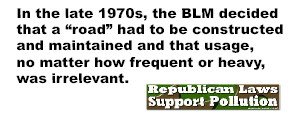
Most notably, in 2009, environmental groups working with local and state politicians put together the Omnibus Public Land Management Act. It included wilderness designation in the Zion-Mojave region of southwest Utah. According to a SUWA press release, it “contains the much improved (and SUWA supported) Washington County Wilderness Bill,” already passed by the Senate. The bill was subsequently signed by President Obama and became law in March 2009.
It was supposed to resolve wilderness disputes in southwestern Utah. The SUWA letter said: “Now, the Omnibus bill only needs President Obama’s signature to ensure a lasting conservation legacy for the Zion-Mojave region and for American citizens both in Utah and around the country who appreciate their open spaces and oppose unfettered sprawl.”
The letter even encouraged all wilderness supporters to thank Senators Bennett and Hatch for their support.
But by December SUWA and other Utah groups were disenchanted. In a 12/9/09 press release executive director Scott Groene wrote, “The Washington County wilderness legislation enacted earlier this year was not the result of consensus as some now claim, but rather a multi-year political fight in Washington, D.C…Importantly, because it was not a consensus bill, there was no agreement to remove lands from America’s Red Rock Wilderness Act that were not protected by the Washington County bill. There is still work to be done in Washington County to protect this proposed wilderness.”
In other words, no ‘agreement’ or ‘consensus’ had been reached after all, and certainly no compromise. The battle for more wilderness in Washington County and southwest Utah would continue, as it would everywhere else in the state.For decades, Utah environmentalists have blamed their inability to get a comprehensive state-wide wilderness bill
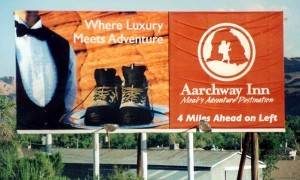 passed on their perceived conservative adversaries. They got nowhere with their 5.7 million acre bill in the late 80s and early 90s and held a Republican White House and a split Congress responsible. With the inauguration of Bill Clinton, spirits rose but the bill still went nowhere and in 1994 Newt and the Republicans re-claimed the House. In ‘96 the Clinton administration raised its estimate of wilderness-quality Utah lands and UWC promptly raised its own estimate by another 4 million acres.
passed on their perceived conservative adversaries. They got nowhere with their 5.7 million acre bill in the late 80s and early 90s and held a Republican White House and a split Congress responsible. With the inauguration of Bill Clinton, spirits rose but the bill still went nowhere and in 1994 Newt and the Republicans re-claimed the House. In ‘96 the Clinton administration raised its estimate of wilderness-quality Utah lands and UWC promptly raised its own estimate by another 4 million acres.Then came President George W Bush and 9/11 and the War on Terror and about all that Utah Greens could do was wait. They dreamed of a Democratic president and a filibuster-proof Senate and in November 2008, they got everything they could ask for.
And they still couldn’t get a Utah wilderness bill passed.
On the day after Obama’s election, SUWA’s Groene wrote, “The new Obama administration and Congress will give us an unprecedented opportunity to protect the redrock country…Yes, we still must work hard to reverse the awful legacy of the Bush administration. But after eight long, hard years, we are about to face perhaps the best opportunity for wilderness protection in SUWA’s 25-year history.”
But the celebrations were short-lived and hardly anything went as planned. For Redrock Wilderness advocates, Obama’s new Interior Secretary Ken Salazar was a particular disappointment. Last year, when Salazar came to Utah to talk wilderness, he made his views clear. He told a packed room of Utah citizens–dominated by SUWA supporters— that he favored a “from the ground up” process that supported local participation and opposed federal designation. Specifically, Salazar insisted the Obama Administration had no intention of creating national monuments on public lands and side-stepping the legislative wilderness process, an idea pushed by SUWA.
“That’s not going to happen,” Salazar said. “That would be the wrong way to go.” Instead he proposed working with locally elected officials to find consensus on wilderness. He hailed the 2009 Washington County lands bill–the legislation so distasteful to SUWA’s Groene—as a model for future legislation.
Salazar said, “I think this is what people want from their government. They want solutions and conclusions.” And, in a reference clearly intended for the litigious SUWA lawyers, Salazar added, “They don’t want interminable processes that don’t lead anywhere.”
According to a news report on Utah public radio’s KUER, “He also insisted that Utah’s Red Rock Wilderness Bill before Congress is the wrong way to go.”
Things only got worse. Salazar briefly agreed to extend administrative protection for some UWC proposed wilderness lands in Utah, but after the Republican midterm sweeps, the Obama administration withdrew the plan. By April 2011, SUWA’s press releases took on an almost desperate tone: “Last Friday night, in a stunning show of disrespect for the last remaining magnificent wild lands in Utah and throughout the West, the Obama administration struck a deal with Republicans that threw the Interior Department’s recently established Wild Lands policy out the window.”
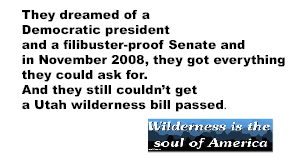
And Groene noted, “The Obama administration has been a steady and enormous disappointment on public lands, but they are very sensitive to public sentiment…”
So what came next? What would anyone in the second decade of the 21st Century do to alter or affect “public sentiment?” With the financial backing of some of America’s richest capitalists, SUWA initiated a massive $2 million media campaign to win the hearts and minds of Utah residents. The slick 30 second tv spots have run frequently in the Salt Lake City market and confidence is high that the saturation ads are working. Matt Gross, SUWA’s media director notes, “…the media campaign is making a difference — attracting more than 18,000 new fans of Utah Wilderness on Facebook, and making it harder than ever for our opponents to demonize wilderness as something Utahns don’t support.”
If it’s on facebook, it must be true. After all, “friends” don’t lie.But doesn’t this really cut to the heart of the problem? How can we trivialize an issue like wilderness with facebook clicks and slippery tv spots?
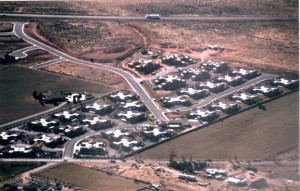 These are not ordinary times—to many of us it appears the world is dangerously close to falling apart. Politically and economically, the country seems to be splitting at the seams. Millions of American are out of work or under-employed with no real hope that things will get better.
These are not ordinary times—to many of us it appears the world is dangerously close to falling apart. Politically and economically, the country seems to be splitting at the seams. Millions of American are out of work or under-employed with no real hope that things will get better.Meanwhile we face the real threat of climate change, driven by an ever-expanding human population and, just as importantly, an insatiable growing demand for consumer products. America always wanted the rest of the world to be “just like us” and now we hover on the brink of getting our wish. The demand for energy and what’s left of the earth’s natural resources is exploding across the “developing world.”
Some scientists fear that the effects of climate change have already reached a tipping point, that only the most draconian measures can allow us any hope of saving the planet as we now know it. How we deal with these kinds of impacts when the planet is already staggering under the weight of our present and past impacts is almost unfathomable.
So worrying about wilderness designation at a time like this, to the exclusion of everything else, feels like a quaint gesture to days-gone-by. To paraphrase Ed Abbey, ‘What good is wilderness without a decent planet to designate it in?’ Single-issue organizations like SUWA have come to view the world through such a tiny aperture, I wonder at times if they realize what’s happening elsewhere.
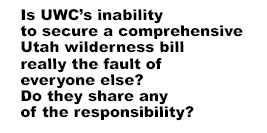
SUWA recently addressed the issue of global warming in its own predictable way. It proposed that climate change is at least partly caused by all the dust thrown into the air by the object of their constant scorn and mortal enemies—the ATVs. No love is lost between me and those noisy monsters either, but I’m not quite ready to blame them for global warming. Are they noisy and dusty on a local scale? Absolutely. Are they to be held responsible for the possible Coming of the Apocalypse? I don’t think so.
In fact, it’s hard to take mainstream environmentalism seriously, from the Big Green national groups, clear down to the grass roots. The “movement” has become fat and bloated, powered (and compromised) by the wealth and influence of some of the world’s wealthiest capitalists, most of them with agendas of their own. At a time when environmentalists should be focused on a message that demands a dramatic reduction in our consumption, that opposes growth for growth’s sake and condemns greed and out-of-control development, it has instead turned to Big Money and all the contradictions that come with it. Environmentalists should be leading by example. Instead they have turned to people like David Bonderman.
Multi-billionaire venture capitalist David Bonderman is a master of LBOs (leveraged buyouts); he pursues money wherever he can find it—from exploiting the debt crises in Europe to building coal fired power plants in Texas to developing coal mines and palm oil plantations in Indonesia. He doesn’t seem to worry about the contradictions his
dealings might have on his moniker as “one of the great conservationists in America today.” (From the Grand Canyon Trust) A recent news story reported that,
“Proposed clean air rules recently released by President Obama’s Environmental Protection Agency that aim to cut mercury emissions from coal-fired power plants…will also produce other, unexpected winners — private-equity heavyweights Henry Kravis and David Bonderman. The two, whose firms have invested in an energy company that runs coal power plants, will see more than $1 billion in savings because the EPA’s proposed rules go easy on the type of coal used in their plants. The huge savings…is tied to the EPA proposal which exempts lignite coal-fired plants, like those run by EFH from having to spend money to reduce pollution levels at the plants.”
None of the environmental groups funded in part by Bonderman raised a voice in protest. And yet, those same groups, like the Grand Canyon Trust and SUWA oppose coal plants in their own back yards.
I once compared the environmental movement to the civil rights battles of the 1950s and 1960s. But imagine the NAACP opposing segregation in Utah but tacitly supporting the same practice, by their silence, a few hundred miles away in Texas. Imagine the NAACP receiving funding from a company that refuses to hire African-Americans. Imagine Martin Luther King accepting support from members of a whites-only country club.
That’s precisely what’s happening now.
Recently, Nobel Peace Prize winner Al Gore talked about racism and climate change in an interview with former advertising executive and Climate Reality Project collaborator Alex Bogusky:
“I remember, again going back to my early years in the South, when the Civil Rights revolution was unfolding…My generation asked old people, ‘Explain to me again why it is okay to discriminate against people because their skin color is different?’ And when they couldn’t really answer that question with integrity, the change really started.
“We have to win the conversation on climate. I think it’s the same where the moral component is concerned and where the facts are concerned I think it is important to get that out there, absolutely.”
According to the story, “The former vice president recalled how society succeeded in marginalizing racists and said climate change skeptics must be defeated in the same manner.”
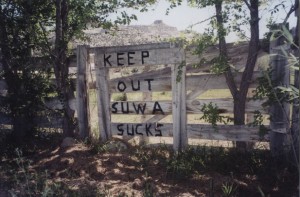
Instead, Americans are growing more skeptical of climate change and environmental issues. A recent Harris poll revealed some troubling trends. “Not only are fewer Americans behaving in environmentally-friendly ways, but many are now also less likely to embrace, or be influenced by, “green” attitudes – just over 1 in 3 U.S. adults (36%) say they are concerned about the planet they are leaving behind for future generations, compared to more than 2 in 5 adults (43%) who said so in 2009.”
Is it little wonder then, that the most notable sign of wilderness support in Utah is a quick count of facebook ‘fans’ and a recitation of the economic advantages that wilderness offers?
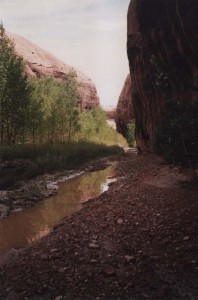 Wilderness was once a moral issue. We sought protection for wildlands because it was the right thing to do. We wanted to protect the plants and the critters and the rocks for their sake, not ours. The idea was to leave something alone, to preserve the last untouched corners of America. And we certainly didn’t promote wilderness because it would be a boon to the amenities/tourist/recreation industry.
Wilderness was once a moral issue. We sought protection for wildlands because it was the right thing to do. We wanted to protect the plants and the critters and the rocks for their sake, not ours. The idea was to leave something alone, to preserve the last untouched corners of America. And we certainly didn’t promote wilderness because it would be a boon to the amenities/tourist/recreation industry.If we gained some spiritual or personal satisfaction and happiness from the presence of wilderness, it was a secondary benefit. We were grateful for its existence, but it’s not why we thought wilderness was important. Abbey wrote that we need wilderness “as surely as we need hope.” But he also noted, “I may never in my life get to Alaska, but I am grateful that it’s there.”
He also once proclaimed that the environmental movement needed fewer lawyers and more poets. Today the wilderness movement in Utah and elsewhere needs to take a hard look at itself. Is it really being honest with the people? Is UWC’s inability to secure a comprehensive wilderness bill for Utah really the fault of everyone else? Do they share any of the responsibility? After all, it’s been almost a quarter of a century.
Are environmentalists looking at the broader picture that includes the dramatic downturn in the economy, the ominous threat of climate change and hard political realities?
If Utah greens can’t even come close to a wilderness bill with the Obama administration, what does the future hold?
Do, in fact, groups like SUWA really WANT a wilderness bill passed in Utah? And can they really justify their growing dependence on big money and the influence of wealthy benefactors who also sit securely on their boards of directors? Does the end really justify the means, even when the “means” smack of hypocrisy?
As years and decades go by, more and more supporters of wilderness are losing interest in the ‘fight,’ because no one is sure who the Good Guys are anymore.MEANWHILE…BACK at the RANCH:
Having said all that, I’m really too damn cheerful to be worried about any of this. Wilderness…Schmilderness.
After all, I’m headed—RIGHT NOW–on my honeymoon…
ADDITIONAL INFORMATION FOR THE WORDPRESS EDITION OF THE ZEPHYR:
HISTORY OF OSPREY PACKS
http://www.ospreypacks.com/en/
HISTORY OF WILDERNESS IN UTAH
http://www.protectwildutah.
http://dailycaller.com/2011/
HARRIS POLL ON ENVIRONMENTAL ISSUES:
http://www.treehugger.com/
LETTER TO SUWA SUPPORTERS FROM SCOTT GROENE, 11/7/08
Dear friend:
The new Obama administration and Congress will give us an unprecedented opportunity to protect the redrock country.
I was deeply moved last night watching President-elect Obama’s acceptance speech. His words brought hope to those of us
kids
watching in Moab, as they did to the crowd in Chicago. In the midst of all the challenges facing our nation – the economy, the wars, a declining environment – I can believe again in a better future for my children.
Yes, we still must work hard to reverse the awful legacy of the Bush administration. But after eight long, hard years, we are about to face perhaps the best opportunity for wilderness protection in SUWA’s 25-year history.
The next Congress also brings us new opportunities for redrock wilderness designation. We have enormous work ahead to educate these new senators and representatives, but with your help, I know we can do it.
President-elect Obama recognizes the threats from climate change and understands we can’t drill our way to energy independence. His thoughtful views are welcome as these issues bear heavily on the future of the Colorado Plateau. And, he will bring a welcome change in leadership to key public land agencies. If he surrounds himself with appointees who understand the importance of wild country, wildlife, healthy landscapes, and a fit planet for our children, wilderness should do well.
We will encourage the new Secretary of Interior and staff at the Bureau of Land Management (BLM) to protect southern Utah’s wilderness, including such places as Labyrinth Canyon, the Dirty Devil, the San Rafael Swell and Cedar Mesa by:
Reviewing disastrous last minute Bush administration decisions for legal violations, including the six awful land use plans the administration just approved, which open millions of acres of redrock wilderness to oil and gas leasing and ORVs.
Reforming the BLM, which manages more of our most spectacular western public lands than any other agency and which folded like a house of cards in a tornado to anti-wilderness interests under pressure from Bush appointees.
Giving meaningful protection to the redrock, by re-instating the process, born under President Clinton and killed by the Bush administration, that gives Wilderness Study Area protection to lands identified by the BLM as having wilderness character.
Please join us at the Southern Utah Wilderness Alliance in celebrating this long-awaited political change! We’ve fought hard for eight years just to hold onto Utah’s Redrock: now we’re excited to move forward, with you, to protect this extraordinary landscape.
Thanks for all your support and work towards protecting the Redrock.
Sincerely,
Scott Groene
Executive Director
LETTER TO SUWA SUPPORTERS…3/25/09
Dear Friend,
Congratulations Utah !! We are only one step away from protecting the Zion-Mojave region’s unique and delicate landscapes including Canaan Mountain, Black Ridge, Beaver Dam Wash, and Doc’s Pass!! And it’s all thanks to you. Today, the House of Representatives passed H.R. 146, the Omnibus Public Land Management Act — which contains the much improved (and SUWA supported) Washington County Wilderness Bill — by a 285-140 margin. Please click here to thank Senators Bennett and Hatch and Representative Matheson for supporting the bill’s passage. This bill has already passed the U.S. Senate and will now head to the White House for approval from the President. Congressional passage signals the final chapter in a long journey for this legislation, which was sponsored by Senator Bob Bennett (R-UT) and supported by the majority of the Utah congressional delegation.
As part of the newly passed Omnibus Public Land Management Act of 2009, Utah will soon double the amount of federally designated Bureau of Land Management Wilderness in Utah! Added to the Cedar Mountains Wilderness designation of 2006, passage of the Washington County Wilderness Bill for the Zion-Mojave region marks nearly 300,000 acres of meaningful protection for lands in America ’s Red Rock Wilderness Act in just the last four years. Both of these bills set positive examples in both Wilderness management language and in landscape protection. Senator Bennett should be commended for his dedication to forging consensus on this issue and opening the door to future wilderness legislation in Utah .
Now, the Omnibus bill only needs President Obama’s signature to ensure a lasting conservation legacy for the Zion-Mojave region and for American citizens both in Utah and around the country who appreciate their open spaces and oppose unfettered sprawl. The Washington County Wilderness Bill has come a long way from the original public land giveaway scheme first introduced in 2006 which was roundly condemned for its lack of protection for wilderness-quality lands. This would never have happened without your continued support and activism and the encouragement of our allies in Congress.
Please thank Senators Bennett and Hatch as well as Representative Matheson for supporting the passage of the omnibus public lands bill.
LETTER TO SUWA SUPPORTERS
FROM EXECUTIVE DIRECTOR SCOTT GROENE…12/9/09
Dear friend,
You may have heard a story Tuesday morning on Salt Lake City radio station KUER about the prospects for future wilderness bills in Utah. A few aspects of the report were wrong, and we want to provide the full story.
The Washington County wilderness legislation enacted earlier this year was not the result of consensus as some now claim, but rather a multi-year political fight in Washington, D.C. Two different versions of the bill were blocked over the course of four years. In the end, because of changes forced by the political fight, the legislation was transformed so that it became a step forward for wilderness that we could support. Importantly, because it was not a consensus bill, there was no agreement to remove lands from America’s Red Rock Wilderness Act that were not protected by the Washington County bill. There is still work to be done in Washington County to protect this proposed wilderness.
The story also wrongly addresses work currently underway in a handful of counties (notably Emery, Beaver, and Piute) to reach agreement over wilderness designation. Contrary to what was stated, there are no legislative proposals for any of these counties other than the Red Rock bill. We are engaged in the county discussions and will keep you all updated as they progress. We hope the outcome will be agreements with county commissions that do in fact resolve wilderness, and which reach the consensus that was elusive in Washington County. Click here for more information about the current status of wilderness legislation for Bureau of Land Management (BLM) administered lands in Utah.
Sincerely,
Scott Groene
Executive Director
LETTER TO SUWA SUPPORTERS FROM STAFFER
RICHARD PETERSON-CREMER, April 2011
Dear friend,
Last Friday night, in a stunning show of disrespect for the last remaining magnificent wild lands in Utah and throughout the West, the Obama administration struck a deal with Republicans that threw the Interior Department’s recently established Wild Lands policy out the window.
Consequently, the continuing budget resolution that keeps the federal government in business until September includes a provision that bars the Interior Department from spending any money on implementing the Wild Lands policy. The House will vote on the package tomorrow (Wednesday, April 13).
The Wild Lands policy was important because it provided a framework under which wilderness-quality BLM lands would be reviewed and then considered for protective management. BLM had operated under a similar policy for 27 years, until 2003, when the Bush administration signed off on a secret deal that disavowed its authority to protect wilderness-quality lands. After the deal, BLM operated as if there were only one resource it could not manage and protect: wilderness.
Of course, the 2003 deal was contrary to federal law. Wilderness is a “multiple use” which BLM has the authority to protect. The Wild Lands policy simply recognized that fact, and gave clear direction and a structure to BLM staff throughout the West to make good on their wilderness responsibilities. Without the order, many BLM staff at the local and state levels were reluctant to protect wilderness for a variety of reasons, including uncertainty about their duties and whether they would get support for protecting worthy areas.
At stake now are millions of acres of Utah’s redrock wilderness that the Bush BLM acknowledged contain wilderness values but declined to protect. Many of these acres were on track to gain increased protections from oil and gas drilling and off-road vehicle damage that had been authorized by the Bush-era BLM. Now, that progress is threatened as Big Oil and other wilderness foes in Congress pressure the White House to trample our wilderness heritage.
We need YOU to tell your members of Congress TODAY that the provision to defund the Wild Lands policy is unacceptable and should not be passed into law.
Thanks for all you do!
Richard Peterson-Cremer
LETTER TO SUWA SUPPORTERS FROM SCOTT GROENE…6/1/11
Breaking news: Obama administration collapses on wild lands protection
Dear friend,
Today, the Obama administration capitulated to a handful of western anti-wilderness politicians by abandoning its 5-month-old Wild Lands policy. This surrender could seriously harm our efforts to protect Utah’s red rock wilderness.
The Wild Lands policy was a response to the much-maligned Bush administration’s “No More Wilderness” policy. The Bush policy repudiated the BLM’s longstanding legal authority, used historically by Republican and Democratic presidents alike, to establish new Wilderness Study Areas. Repeal of the No More Wilderness policy should have been the Obama administration’s top priority for public lands when it won the 2008 election. Not so. Instead, the administration dithered for nearly two years before reversing the policy – sort of. It issued new, weak guidance – the Wild Lands policy – which was better than nothing. Today, they’ve retreated to nothing. Under Secretary Salazar’s June 1st memo the Obama administration promises NOT to protect America’s outstanding public lands as “wildlands,” let alone as wilderness study areas.
This fight isn’t over. The Obama administration has been a steady and enormous disappointment on public lands, but they are very sensitive to public sentiment. It’s time they heard from all of us who believe Utah’s wild canyon country deserves protection.
Please contact the Council on Environmental Quality (the President’s advisor on matters of environment, natural resources and energy) and let them know that this administration should get in line with past administrations, Republican and Democratic, and assert its authority to protect our last special places in Utah and across the west.
Sincerely,
Scott Groene
LETTER TO SUWA SUPPORTERS FROM RICHARD PETERSON-CREMER…6/9/11
Dear Friend,
Please ask the Obama administration to respond to the threats posed by off-road vehicle damage in the Greater Canyonlands region!
“Failure to respond is a form of appeasement that has not worked in the past and it will not work this time.” – Bruce Babbitt
These words at the National Press Club yesterday, directed at the Obama administration’s lackluster public lands accomplishments, remind us of what environmental leadership looks like.
Bruce Babbitt served as Secretary of Interior for eight years under President Clinton, at a time no less contentious than the current administration’s – yet he got things done. Exhibit A: the designation of the Grand Staircase-Escalante National Monument in southern Utah, a feat he characterized yesterday as a widely acclaimed decision, despite the backlash it engendered at the time.
This goes to the core piece of the former Secretary’s message to Obama – face your adversaries and be proactive, don’t appease and don’t let them control the forum.
Tell the Obama administration to start getting things done by protecting the Greater Canyonlands region!
Too often, the Obama administration has favored appeasement over taking proactive steps to further a conservation agenda. They’ve defended the Bush administration’s bad decisions and done nothing to protect identified wilderness resources.
Acknowledging the anti-environmental bent of this Congress, Babbitt focused on National Monuments as a crucial tool that Obama can use to forward conservation.
There are numerous landscapes in Utah meriting Monument status. Two made their way to a list of potential designations last year – the San Rafael Swell and Cedar Mesa. SUWA has also forwarded the idea of protecting the Greater Canyonlands region, and recently we filed a petition with the Interior Secretary asking for closure of certain off-road vehicle routes that impact that area’s resources.
Please take a moment to tell the Obama administration to protect Greater Canyonlands!
Without action and real leadership on public lands issues, the administration faces a real problem, as Sierra Club Executive Director Mike Brune pointed out to the L.A. Times: “Unless there’s a change in his policies, he will likely face very damp enthusiasm from young voters and a significant portion of the base that wants him to stand up to polluters.”
As always, we stand ready to work with the Obama administration to accomplish a lasting conservation agenda for Utah and stand up to bullies in Congress who would rather undermine protections or just see nothing happen. But, it takes leadership. Now, it’s Obama’s turn.
Thank you for taking action!
Richard Peterson-Cremer
LETTER TO SUWA SUPPORTERS FROM MEDIA DIRECTOR MATT GROSS
Dear Friend of Utah Wilderness,
By now, you’ve probably seen the ads.
Last November, we launched a sustained, multi-year media campaign here in Utah to build support for wilderness protection.
Since then, our commercials have been appearing on broadcast and cable television stations across the state, and they’ve been bolstered by outdoor advertising in the Salt Lake City metro area and by online ads aimed at residents of Utah.
Now, we want you to be among the first to see SUWA’s new television spots, which begin airing statewide in Utah on Monday.
Click here to see SUWA’s new pro-wilderness ads.
Every day, our ongoing media campaign increases public awareness and understanding of Utah’s proposed wilderness areas, their accessibility to the general public, and the value that protecting Utah’s wilderness areas brings to our state’s economy.
And already, the media campaign is making a difference — attracting more than 18,000 new fans of Utah Wilderness on Facebook, and making it harder than ever for our opponents to demonize wilderness as something Utahns don’t support.
Please take a moment to watch the new ads. Then, help us get the word out in Utah about the value of wilderness by making a contribution today.
Thank you for everything you do.
Mathew Gross
Media director


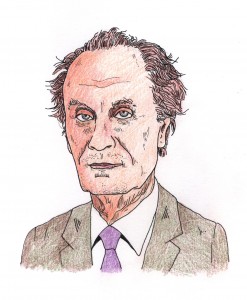
Point well taken. There is a danger that we are becoming numb to important issues that matter. It is also important that we remain informed. There is way too much information and too little fact in what we are bombarded with daily. It adds to the “numbness”.
Jim – As always you make valid points about SUWA and the hypocrisy of Bonderman. But I’m struggling to understand your point as it relates to doing something (anything) positive for the environment (like halting more drilling).
Let’s say hypothetically that SUWA dumps Bonderman and changes its focus to the morality of clean air, water and a sustainable population. Do you really believe the stubborn and ignorant opposition to having a healthy environment will magically attain elevated IQ’s and support this? Sorry brother, but it isn’t going to happen. So my money is on my enemy’s, enemy remaining my friend. YMMV
If not SUWA, who? No group is fighting like SUWA to save wilderness land in Utah. Anybody want to step up and take there place? The courts right now are the only defense SUWA has. Obama and congress have been such a brutal disapointment.Long live SUWA,their cause is great and just. Don SUWA member(lives on east coast).